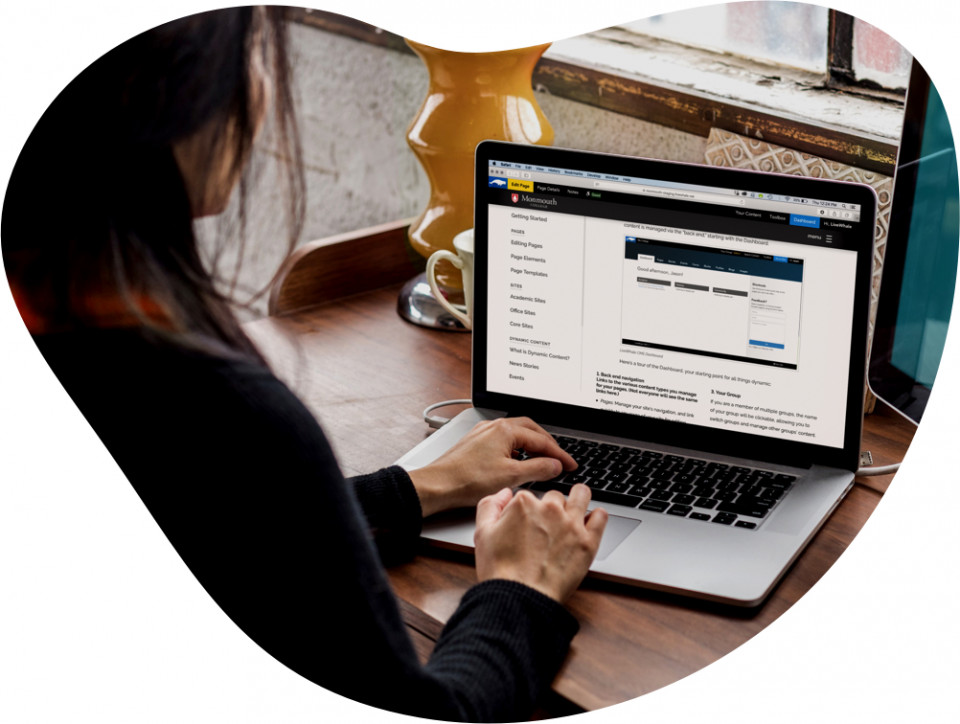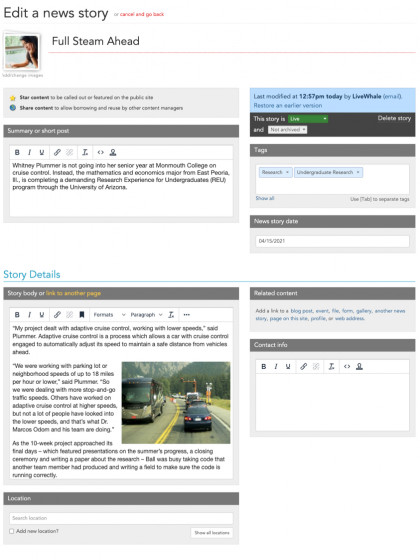Content Strategy and Governance
Ideas for managing a LiveWhale Calendar community— including some key decisions that communicators have to make about workflow and process, and some models in use at other schools.
LiveWhale Calendar was built to require only a minimal amount of care and feeding. People post events on calendars because they want attendance at their events; thus your content creators have a built-in incentive to keep your calendar fresh. As long as a calendar is easy to use as LiveWhale, you’ll never run out of content.
There is one important area where attention from communicators and web teams can really make a difference: content strategy, also known as “which content to show where, and to whom.” Your community will create lots of events; are some more important than others? Which events are useful or interesting to your external audiences, and which are only needed by your campus community? Which events help tell the story of your college to the world, and how can we maximize their impact?
These are the sorts of content strategy decisions that can turn functional and effective calendars into powerful storytelling and marketing tools.
Your “main calendar” and other calendars
Most of what we’re discussing in this section presumes that you’ll have a main calendar— the calendar displayed on your calendar homepage— that shows only a subset of the events being created at your institution. Most of what we’ll discuss here involves the choices you make about exactly what gets shown on your main calendar, and what events will live only on group calendars.
No matter how you choose to make these decisions, visitors to your calendar can get from the main calendar to the rest of your events in a couple of ways:
- By using a “Jump to calendar” dropdown list in the LWC interface and switching to a different calendar.
- By searching (if you have the search_all_groups setting active, meaning a search will include results from all groups).
- By visiting the webpages of individual departments and seeing events displayed on those sites via widgets.
Five decisions you need to make
Here are some of the basic things to think about as you embark on a calendar implementation.
The first impression
When visitors arrive at calendar.yourschool.edu (or the URL of your choice), what should they see there?
There’s nothing wrong with a calendar that’s clean, straightforward, and functional. Many of our customers deploy LiveWhale Calendar in its default configuration, with basic theming to match their sites, and are very happy with the results. A good basic calendar goes a long way.
Other customers have chosen to invest more time and energy in the first impression their calendars make. Some add featured event widgets to their calendar homepage, or even create a custom “home” view that puts their most important events up front in a visually striking way.
(list some examples of each of these; nicest basic calendars, and then more striking choices like SFU, maybe Syracuse?)
How many events, and which ones?
At large universities (and even some small colleges), there can be dozens if not hundreds of events happening every day. If all those events are shown together on your calendar, it’ll certainly demonstrate your active community— but also risks your most interesting events getting lost in a flood of primarily internal events. Here are a few strategies that have worked for our customers:
- Limit events on your main calendar to a single “campus calendar” group, and encourage other groups to submit their events for promotion on the main calendar. We’ll discuss groups and group calendars below.
-
Only show events on the main calendar with a public audience, or that have been marked as featured by their creators. Assuming you’ve got an “Open to the Public” event type or audience, you may choose to only display those events on the primary campus calendar, and use other calendars for internal events. Or you could choose to only show starred events by default, thus limiting the calendar to events which have been marked as featured.
This will let you limit the volume of calendar events without needing to maintain a special campus calendar group. But it does put some important decisions in the hands of your event creators; if your career services center decides to mark all of their events as featured and public, that can have an impact on your calendar’s first impression. So these solutions do require some degree of internal conversation with calendar managers.
How will your community contribute?
Departments and offices posting their own events is the key to a sustainable, flourishing campus calendar. You may not always want all these events on your main calendar, but there should be some return on the investment of time your people spend posting events; if departmental events are of public interest, they should appear on your main calendar.
You can also solicit event submissions directly from your community, who may not be registered users in your system. LiveWhale Calendar includes a public submission form that can be used by any visitor to your calendar. (Read more about the available options on the public submission form here.)
How much oversight?
Who decides?
These final two decisions might have answers big or small, and we can help you find the approach best for you in the process of your calendar build and roll-out.
Event types
There are many taxonomies (ways to categorize and filter) events in LiveWhale, but one of the most prominent is Event Types. When editing an event, you’ll see out-of-the-box we start you off with these options:
- Open to the Public
- Academic Calendar
- Appointments
- Athletics
- Community Outreach
- Deadlines
- Important Dates
- Lectures
- Miscellaneous
- Performances
- Student Organizations
Some schools launch their calendars with these intact, and that’s just fine. However, as an administrator you can customize these, adding, editing, or deleting as you like.
General principles when customizing event types
• Event types are often the first way a calendar visitor might see to filter their results. As such, we think event types should be understandable by all your audiences (prospective students, current students, families, alumni, faculty, staff), avoiding lingo or technical terms as much as possible.
• Event types should be broad. You probably don’t want your visitors having to skim more than 10–12 categories, and in most cases we suggest they should be general enough to be applied to all calendar groups. For example, “Performances” would be a great type because it’s fitting to many groups, such as arts, music, theatre, student life, etc.
• However, you can (and we encourage) limiting certain special types to specific groups. For instance, maybe only your Registrar group should have access to the “Academic Calendar” event type.
• Note, there are separate lists of event types for Campus and Audience, which you can use or not. You also can add front-end checkboxes for those or not, your choice. Some schools even re-purpose one or both, renaming “Campus” to “Area of Interest” or “Topic” as a small customization.
Examples
Here is a not-exhaustive list of some of the custom categories LiveWhale Calendar schools have created as event types:
- Academic Calendar
- Academic Support
- Admissions
- Alumni
- Alumni Gatherings
- Art and museum exhibitions
- Art, music, films, and performances
- Athletics
- Auditions and Rehearsals
- Awards, Receptions and Celebrations
- Career development
- Community Outreach
- Community events
- Conference
- Conference or Symposium
- Conferences and Colloquia
- Culture and diversity
- Discussion Group
- Entertainment
- Exhibit
- Exhibition
- Exhibits
- Fair
- Fair or Expo
- Film Screening
- Free Food
- Fun and recreation
- Functions, festivals, and celebrations
- Health and wellness
- Hours
- Induction, Awards, Honors
- Information Session
- Lecture, Reading, Talk
- Lectures
- Lectures, Seminars and Workshops
- Lectures, talks, seminars, and conferences
- Lectureship
- Meeting
- Office Hours
- Open to the Public
- Performance
- Performances
- Performances, Concerts and Exhibitions
- Performances, shows, and films
- Presentation
- Public Lecture
- Reception
- Religious
- Reunion
- Seminar
- Seminar or Forum
- Social
- Social Event, Study Break
- Sporting events
- Student Life
- Student Organizations
- Student success and career development
- Study and Review Sessions
- Tour
- Training or Webinar
- Training or Workshop
- University Recreation
- Volunteer and fundraising opportunities
- Workshop
Event types we recommend
When thinking about what event types will work best for your school’s calendar, we suggest you consider the following:
Open to the Public
This is a special event type in LiveWhale—if you include it on your calendar, it will always appears first in the list of checkboxes (while the rest are in alphabetical order). This is because we think it’s a great first option for new folks browsing your calendar, as it answers the question: what events can I go to?
Academic Calendar (sometimes called: Registrar Calendar, Important Dates)
Almost everyone who cares about your institution will care about certain questions—when is the last day of classes? When is Commencement? When is the first day of Spring Break? We suggest having an Academic Calendar event type specifically for those important dates. In may be wise to limit access to this event type to only one group (otherwise, we know lots of people would like their events to appear on the Academic Calendar)!
Athletics and Arts & Performances
Both of these high-level filters are great for site visitors who just want to quickly find what they’re looking for. You can always use tags (like Basketball, Men’s Soccer, Theatre, or Music) to filter further in widgets for your other pages.
Sample governance models
Let’s talk about how governance and workflow happen at a few LWC institutions.
What we’d do if we were you
We love to give advice! While we’re still fleshing out our general recommendations, feel free to get in touch if you’d like to talk through how LiveWhale Calendar can work best for your institution.











